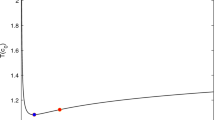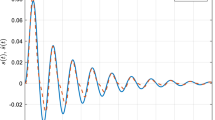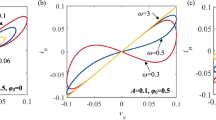Abstract
The stochastic disturbances are common in real world and usually cause significant influence to engineering system. In this work, the stochastic disturbance is introduced into the quaternion-valued memristive neural networks (QVMNNs). The exponential input-to-state stabilization (EITSS) problem of stochastic QVMNNs is investigated. In order to be more effective and less costly in real applications, an event-triggered control strategy is adopted. The original QVMNNs are separated into four equivalent real-valued NNs by using Hamilton rule. Then, by using the Lyapunov functional approach and stochastic analysis technique, novel sufficient conditions for mean square EITSS of stochastic QVMNNs are derived. Moreover, it is proved that Zeno behavior will not take place in our event-triggered control method. Thus, the mean square EITSS problem of stochastic QVMNNs is solved in this work with less control cost. Lastly, simulation is performed to manifest the correctness of the theorem.






Similar content being viewed by others
Data Availibility
Data sharing is not applicable to this article as no datasets were generated or analyzed during the current study.
References
Chua LO. Memristor-the missing circuit element. IEEE Transactions on Circuit Theory. 1971;18(5):507–19.
Strukov D, Snider G, Stewart D, Williams RS. The missing memristor found. Nature. 2008;453:80–3.
Miller K, Nalwa KS, Bergerud A, Neihart NM, Chaudhary S. Memristive behavior in thin anodic titania. IEEE Electron Device Lett. 2010;31(7):737–9.
Cantley KD, Subramaniam A, Stiegler HJ, Chapman RA, Vogel EM. Hebbian learning in spiking neural networks with nanocrystalline silicon TFTs and memristive synapses. IEEE Trans Nanotechnol. 2011;10(5):1066–73.
Liu D, Zhu S, Sun K. Global anti-synchronization of complex-valued memristive neural networks with time delays. IEEE Trans Cybern. 2019;49(5):1735–47.
Chen J, Zeng Z, Jiang P. Global Mittag-Leffler stability and synchronization of memristor-based fractional-order neural networks. Neural Netw. 2014;51:1–8.
Sheng Y, Huang T, Zeng Z, Miao X. Global exponential stability of memristive neural networks with mixed time-varying delays. IEEE Trans Neural Netw Learn Syst. 2021;32(8):3690–9.
Chen C, Li L, Peng H, Yang Y. Fixed-time synchronization of inertial memristor-based neural networks with discrete delay. Neural Netw. 2019;109:81–9.
Wei R, Cao J. Fixed-time synchronization of quaternion-valued memristive neural networks with time delays. Neural Netw. 2019;113:1–10.
Simmons GF. Calculus gems: brief lives and memorable mathematics. New York, NY, USA: McGraw-Hill. 1992.
Adler SL. Quaternionic quantum mechanics and quantum fields. New York, NY, USA: Oxford Univ. Press. 1995.
Took CC, Mandic DP (2009) The quaternion LMS algorithm for adaptive filtering of hypercomplex processes. IEEE Trans Signal Process. 2009:57(4)1316-1327.
Zou C, Kou K, Wang Y. Quaternion collaborative and sparse representation with application to color face recognition. IEEE Trans Image Process. 2016;25(7):3287-3302.
Xia Y, Jahanchahi C, Mandic DP. Quaternion-valued echo state networks. IEEE Trans Neural Netw Learn Syst. 2015;26(4):663–73.
Isokawa T, Kusakabe T, Matsui N, Peper F. Quaternion neural network and its application. In: Proc. 7th Int. Conf. KES, pp. 318-324. Oxford, U.K. 2003.
Qin S, Feng J, Song J, Wen X, Xu C. A one-layer recurrent neural network for constrained complex-variable convex optimization. IEEE Trans Neural Netw Learn Syst. 2018;29(3):534–44.
Global dissipativity analysis for delayed quaternion-valued neural networks. Z. Tu, J. Cao, A. Alsaedi, and T. Hayat. Neural Netw. 2017;89:97–104.
Song Q, Chen X. Multistability analysis of quaternion-valued neural networks with time delays. IEEE Trans Neural Netw Learn Syst. 2018;29(11):5430–40.
Xia Z, Liu Y, Lu J, Cao J, Rutkowski L. Penalty method for constrained distributed quaternion-variable optimization. Neural Netw. 2021;51(11):5631–6.
Liu Y, Zhang D, Lou J, Lu J, Cao J. Stability analysis of quaternion-valued neural networks: decomposition and direct approaches. IEEE Trans Neural Netw Learn Syst. 2018;29(9):4201–11.
Chen X, Song Q. State estimation for quaternion-valued neural networks with multiple time delays. IEEE Trans Syst Man Cybern Syst. 2019;49(11):2278–87.
Wei R, Cao J. Synchronization control of quaternion-valued memristive neural networks with and without event-triggered scheme. Cogn Neurodyn. 2019;13:489–502.
Li N, Cao J. Global dissipativity analysis of quaternion-valued memristor-based neural networks with proportional delay. Neurocomputing. 2018;321:103–13.
Jiang Z, Wang Y. Exponential input-to-state stability of quaternion-valued neural networks with time delay. Appl Math Comput. 2019;358:382–93.
Yang Z, Zhou W, Huang T. Exponential input-to-state stability of recurrent neural networks with multiple time-varying delays. Cogn Neurodyn. 2014;8:47–54.
Zhu Q. Stabilization of stochastic nonlinear delay systems with exogenous disturbances and the event-triggered feedback control. IEEE Trans Autom Control. 2019;64(9):3764–71.
Zhu Q, Cao J, Rakkiyappan R. Exponential input-to-state stability of stochastic Cohen-Grossberg neural networks with mixed delays. Nonlinear Dyn. 2015;79:1085–98.
Qi X, Bao H, Cao J. Exponential input-to-state stability of quaternion-valued neural networks with time delay. Appl Math Comput. 2019;358:382–93.
Dolk V, Heemels M. Event-triggered control systems under packet losses. Automatica. 2017;80:143–55.
Liuzza D, Dimarogonas DV, Bernardo MD, Johansson KH. Distributed model based event-triggered control for synchronization of multi-agent systems. Automatica. 2016;73:1–7.
Guo Z, Gong S, Wen S, Huang T. Event-based synchronization control for memristive neural networks with time-varying delay. IEEE Trans Cybern. 2019;49(9):3268–77.
Liu H, Wang Z, Shen B, Liu X. Event-triggered state estimation for delayed stochastic memristive neural networks with missing measurements: the discrete time case. IEEE Trans Neural Netw Learn Syst. 2017;29(8):3726–37.
Yao L, Wang Z, Huang X, Li Y, Ma Q, Shen H. Stochastic sampled-data exponential synchronization of Markovian jump neural networks with time-varying delay. IEEE Trans Neural Netw Learn Syst. 2023;34(2):909–20.
Ni Y, Wang Z, Huang X, Ma Q, Shen H. Intermittent sampled-data control for local stabilization of neural networks subject to actuator saturation: a work-interval-dependent functional approach. IEEE Transactions on Neural Networks and Learning Systems. 2022. https://doi.org/10.1109/TNNLS.2022.3180076
Funding
This research was supported by the Natural Science Foundation of Jiangsu Province under Grant No. BK20210635 and the Key Project of Natural Science Foundation of China (No. 61833005).
Author information
Authors and Affiliations
Corresponding author
Ethics declarations
Ethical Approval
This article does not contain any studies with human participants or animals performed by any of the authors.
Informed Consent
The research is not involved human participants.
Conflict of Interest
The authors declare no competing interests.
Additional information
Publisher's Note
Springer Nature remains neutral with regard to jurisdictional claims in published maps and institutional affiliations.
Rights and permissions
Springer Nature or its licensor (e.g. a society or other partner) holds exclusive rights to this article under a publishing agreement with the author(s) or other rightsholder(s); author self-archiving of the accepted manuscript version of this article is solely governed by the terms of such publishing agreement and applicable law.
About this article
Cite this article
Wei, R., Cao, J. & Gorbachev, S. An Event-Triggered Method for Stabilization of Stochastic Quaternion-Valued Memristive Neural Networks. Cogn Comput 16, 75–85 (2024). https://doi.org/10.1007/s12559-023-10186-9
Received:
Accepted:
Published:
Issue Date:
DOI: https://doi.org/10.1007/s12559-023-10186-9




